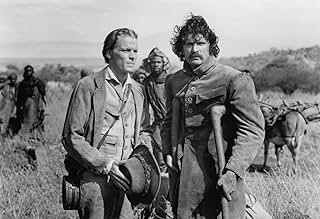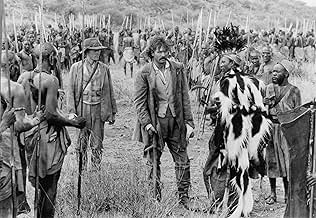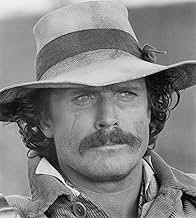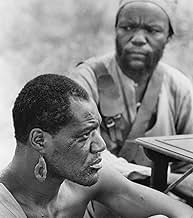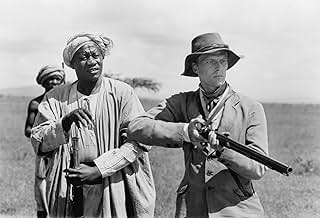AVALIAÇÃO DA IMDb
7,1/10
4,5 mil
SUA AVALIAÇÃO
Adicionar um enredo no seu idiomaThe legendary true-story of Capt. Richard Francis Burton and Lt. John Hanning Speke's tumultuous expedition to find the source of the Nile river.The legendary true-story of Capt. Richard Francis Burton and Lt. John Hanning Speke's tumultuous expedition to find the source of the Nile river.The legendary true-story of Capt. Richard Francis Burton and Lt. John Hanning Speke's tumultuous expedition to find the source of the Nile river.
- Direção
- Roteiristas
- Artistas
- Prêmios
- 1 vitória no total
Avaliações em destaque
In the Nineteenth Century, the British writer, geographer and explorer Captain Richard Francis Burton (Patrick Bergin) meets the Lieutenant John Hanning Speke (Iain Glen) during a dangerous journey in Africa and after being saved by Speke, they become friends. Soon they team-up to seek the source of the Nile River sponsored by the Royal Geographic Society. Meanwhile Burton meets his fan Isabel Arundell (Fiona Shaw) and they get married to each other. Burton and Speke travel for many months through Africa where they face brutal tribes, diseases, hunger and many other dangers together. Speke finds a lake that he believes it is the source of Nile River but Burton disagrees and believes they need more scientific research to be sure. When they separately return to London, the ambitious publisher Larry Oliphant (Richard E. Grant) stirs up a quarrel between the two friends and Speke travels alone to Africa trying to prove his findings. Will their friendship end?
"Mountains of the Moon" is a fascinating adventure with a story of friendship based on a historic event, the journey of Captain Richard Francis Burton and Lieutenant John Hanning Speke to the African Great Lakes. The plot may be not accurate but the film is engaging and the landscapes are breathtaking. The viewer does not feel the 136 minutes running time. My vote is eight.
Title (Brazil): "Montanhas da Lua" ("Mountains of the Moon")
"Mountains of the Moon" is a fascinating adventure with a story of friendship based on a historic event, the journey of Captain Richard Francis Burton and Lieutenant John Hanning Speke to the African Great Lakes. The plot may be not accurate but the film is engaging and the landscapes are breathtaking. The viewer does not feel the 136 minutes running time. My vote is eight.
Title (Brazil): "Montanhas da Lua" ("Mountains of the Moon")
I have to admit that, before it was shown on television a few weeks ago, I had never heard of the movie. When I see how many people wrote a review or voted for this movie on IMDb, I guess I'm not the only one. It's clear to me that this is a movie that has never had any attention. Not from the public, the cinema's nor the festivals. Even journalist didn't pay much attention to it. Does that mean this movie isn't worth seeing? Certainly not, although the subject probably isn't very attractive to the mainstream audience.
The movie tells the story of Burton and Speke, two friends and explorers who tried to find the source of the Nile in the middle of the nineteenth century. Burton was more of an anthropologist who wanted to learn more about the indigenous tribes which they encountered on their journeys, while Speke was more interested in the discovery of the source itself. Once they were back home they become enemies, because Speke tells everybody who wants to hear it that he alone discovered the source of the Nile, namely Lake Victoria.
There are different things that I liked about this movie. The acting was very good, the costumes were nice, but what I really liked were the images from the African landscapes, the animals, the people... Seeing the images from England just made me look forward to the next scenes in Africa. It never felt right to see these two explorers in England, you're always left with the feeling that they belong in Africa. I guess that is where the strength of this movie lies ... It makes you feel exactly the way these men felt. I reward this little masterpiece with an 8/10.
The movie tells the story of Burton and Speke, two friends and explorers who tried to find the source of the Nile in the middle of the nineteenth century. Burton was more of an anthropologist who wanted to learn more about the indigenous tribes which they encountered on their journeys, while Speke was more interested in the discovery of the source itself. Once they were back home they become enemies, because Speke tells everybody who wants to hear it that he alone discovered the source of the Nile, namely Lake Victoria.
There are different things that I liked about this movie. The acting was very good, the costumes were nice, but what I really liked were the images from the African landscapes, the animals, the people... Seeing the images from England just made me look forward to the next scenes in Africa. It never felt right to see these two explorers in England, you're always left with the feeling that they belong in Africa. I guess that is where the strength of this movie lies ... It makes you feel exactly the way these men felt. I reward this little masterpiece with an 8/10.
10Big O-7
Capt. Sir Richard Francis Burton and his mate, John Hanning Speke's travels to find the source of the Nile, and travails to claim the rigth to say that either of these two gentlemen adventurers discovered the source of the Nile makes for one of the biggest and best EPIC adventure films in recent memory. The performances from Patrick Bergin (better known for PATRIOT GAMES and SLEEPING WITH THE ENEMY), and Ian Glen (last seen on Broadway opposite Nicole Kidman in THE BLUE ROOM), turn in career-making perfomances as the two polar opposites who race to find the glory at the end of finding the source of the Nile. Bob Rafaelson, the man behind the camera, does not feel the need to spare the audience of any graphic details from the expeditions (including spearings, native sex, castrations, and ugly political maneuvering), and in the end, this is the best way to go since sparing us would have cheated us. Nor does he feel the need to spare us from any ticks in the characters themselves (Burton's blatant drinking and womanizing) and their questions (Is Speke gay? Who does end up with the bigger ego?). But the film's greatest achievements are:
1 - It makes you understand why these two gentlemen lived the lives they lived.
2- It makes you want to read more about them.
3- It really does make you feel like you too, got to go to see the Mountains of The Moon.
1 - It makes you understand why these two gentlemen lived the lives they lived.
2- It makes you want to read more about them.
3- It really does make you feel like you too, got to go to see the Mountains of The Moon.
The British Empire owed a lot to opportunistic soldiers of fortune as well as to explorers: men who risked their lives (and the lives of others) for profit, fame and the recognition from their peers for their accomplishments. In the last category one could think of men like Livingstone, Stanley, Scott and Burton. Captain Richard Francis Burton (whose life we follow in this film) risked a lot for the sake of discovery (to find the source of the Nile) but at the same time he was also a man with a genuine interest and outmost respect for the indigenous peoples and cultures found deep in Africa.
In the film we see Burton joining forces with a young and ambitious Lieutenant (Lt. Speke) to travel again to his beloved Africa to locate the source of Nile with an expedition funded by the Royal Geographical Society. The film is an account of this trip but shows also events before and after this. Watching this movie we can grasp the differences between the two men, their strong ties and friendship during their common effort in the expedition and also later how each one coped with their success at home (London).
The Mountains of the Moon is a fascinating film. It tells a great story without romanticizing the situations during and after the trip to Africa. Burton, Speke and their comrades endured too much to find the source of Nile, and all of them for their own reasons. The novel by William Harrison (that this movie is based on) does not fall into the trap of trying to imitate Conrad's 'Heart of Darkness' but gives us a different perspective altogether. Do not miss this film.
In the film we see Burton joining forces with a young and ambitious Lieutenant (Lt. Speke) to travel again to his beloved Africa to locate the source of Nile with an expedition funded by the Royal Geographical Society. The film is an account of this trip but shows also events before and after this. Watching this movie we can grasp the differences between the two men, their strong ties and friendship during their common effort in the expedition and also later how each one coped with their success at home (London).
The Mountains of the Moon is a fascinating film. It tells a great story without romanticizing the situations during and after the trip to Africa. Burton, Speke and their comrades endured too much to find the source of Nile, and all of them for their own reasons. The novel by William Harrison (that this movie is based on) does not fall into the trap of trying to imitate Conrad's 'Heart of Darkness' but gives us a different perspective altogether. Do not miss this film.
"Mountains of the Moon" is the kind of epic that seems to need a director like Bob Rafelson. I hoped this would be his "Lawrence of Arabia," but something goes amiss in the construction of the drama which Rafelson coauthored. For instance, we learn more about the two protagonists in two single lines than the 40 minutes that begin the film: Speke: (asking permission to organize some specific details of setting up an expedition in to the interior of Africa) responds, "I already have"; and for Burton: (a voice over) "Dear Isabelle
." The meandering, surprisingly cruel, first 40 minutes of the film become irrelevant.
Speke and Burton's search to find the source of the Nile is great material for a film. The scenery alone would lead any director to jump at the chance, but as so often occurs with films about Africa, the Continent overpowers the human drama. Rafelson is a master of human intimacy, and this story of two men's friendship which turns to rivalry is badly mangled by the screenplay. Burton's life alone is a huge trove for the subject of a film, and Rafelson seems to never grip the nature of these men, the essence of the story nor how to tell it.
Yet, the film is worth spending time with only to lavish in the effort of these two men and perhaps the last time when "discovery" meant a places on a map.
Speke and Burton's search to find the source of the Nile is great material for a film. The scenery alone would lead any director to jump at the chance, but as so often occurs with films about Africa, the Continent overpowers the human drama. Rafelson is a master of human intimacy, and this story of two men's friendship which turns to rivalry is badly mangled by the screenplay. Burton's life alone is a huge trove for the subject of a film, and Rafelson seems to never grip the nature of these men, the essence of the story nor how to tell it.
Yet, the film is worth spending time with only to lavish in the effort of these two men and perhaps the last time when "discovery" meant a places on a map.
Você sabia?
- CuriosidadesThe spear through Burton's face was an actual event, although the scar as depicted was wrong. The spear split his palate, causing a serious internal fracture of the jaw. It also came close to severing his tongue and it knocked out a half-dozen teeth, as well. The fact that he could survive such an extreme injury was near miraculous.
- Erros de gravaçãoIn an scene set in 1854, Isabel is looking at a copy of "The Perfumed Garden" translated by Burton. Burton did not publish this translation until 1886. While Burton's translation was published in 1886, the original was written between 1410 and 1434. (Burton's unexpurgated translation, to be called "The Scented Garden", was still only in manuscript form when he died. Isabel burned it, believing that would help save his soul from damnation.)
- Citações
Arab chief in Cairo: In this wilderness you will find only Allah's terrible whimsy.
- Cenas durante ou pós-créditosThis motion picture's opening title card reads: "East African Coast 1854".
Principais escolhas
Faça login para avaliar e ver a lista de recomendações personalizadas
- How long is Mountains of the Moon?Fornecido pela Alexa
Detalhes
- Data de lançamento
- País de origem
- Idiomas
- Também conhecido como
- Montanhas da Lua
- Locações de filme
- Empresas de produção
- Consulte mais créditos da empresa na IMDbPro
Bilheteria
- Orçamento
- US$ 19.000.000 (estimativa)
- Faturamento bruto nos EUA e Canadá
- US$ 4.011.793
- Fim de semana de estreia nos EUA e Canadá
- US$ 66.683
- 25 de fev. de 1990
- Faturamento bruto mundial
- US$ 4.011.793
- Tempo de duração2 horas 16 minutos
- Cor
- Proporção
- 1.85 : 1
Contribua para esta página
Sugerir uma alteração ou adicionar conteúdo ausente

Principal brecha
By what name was As Montanhas da Lua (1990) officially released in India in English?
Responda



